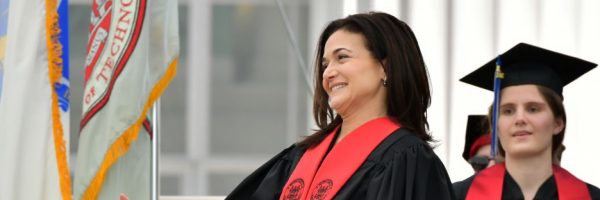Wharton Reveals 2018 MBA Employment Report, Announces $25 Mil Gift

Lots of news out of the Wharton School at the University of Pennsylvania recently. Employment statistics have been published for the most recent graduating class, and a big donation will fund a cool new building dedicated to entrepreneurship in West Philadelphia as well as more international scholarships for undergraduates.
Here’s what’s going on at the Wharton School.
Penn Employment Report (2018)
The 2018 MBA Career Report revealed a slight increase in job offers and salaries with finance drawing in more students than ever. In 2018, 36.9 percent of full-time MBA graduates went into financial services (up from 33 percent last year). Consulting lured the second most graduates at 25 percent, down from 28 percent in 2017. As for technology—the third most sought-after industry—this year there was a small dip down to 14.9 percent from 16 percent in 2017.
Employment Summary
Overall, of the 77.9 percent of Wharton MBAs seeking employment, 98.4 percent received a job offer 90 days post-graduation, and 94.6 percent accepted. For the remaining 17.2 percent not seeking employment—140 students—84 returned to their current company (60 percent), 34 started their own company (24 percent), 17 postponed their job search (12 percent), and five students gave another reason (3 percent).
As for top employers, many prominent companies hired two or more graduates including Accenture Strategy, Facebook, Amazon, Apple, Bain & Company, Deloitte Consulting, McKinsey & Company, Microsoft, and Tesla.
Salaries Rise
Wharton MBA salaries continued their climb, with the school reporting a $5,000 increase in total median base salary, bringing that figure to $135,000 in 2018. The highest median salary—$180,000—went to graduates heading into professional services, followed by venture capital at $175,000 and hedge fund managers at $162,000.
As for regional differences in salaries, the 42.7 percent of Wharton MBA graduates who accepted positions in the Northeastern United States commanded a median salary of $140,000. Another 23.2 percent of grads headed to the West, where the median annual salary was $135,000. The Mid-Atlantic region of the U.S., with its median annual salary of $139,000, drew the third largest percentage of grads, at 7.7 percent. Interestingly, those who took jobs in the Midwest and South reported the biggest paydays, with a median salary of $150,000. This was trailed by the Southwest, with a median annual salary of $145,000.
Another 11.7 percent of the graduating class sought post-graduation employment outside the United States, where salaries on the whole were lower. In Latin America, the median annual salary is $92,000. Salaries are slightly better in Europe, where the median is $119,000, and best in Asia, at $126,000.

$25 Million Gift for Scholarships and New Hall
Right on the heels of publishing its employment statistics last week, the Wharton School also announced a $25 million gift. The transformative gift will go toward constructing Tangen Hall, the first-ever dedicated space for cross-campus entrepreneurship at the University of Pennsylvania. It will also establish an international scholarship fund.
“This gift not only represents a profound commitment to Penn and Wharton student financial aid; it also energizes our entire campus community through Tangen Hall, a game-changing facility for innovation, entrepreneurship, and technology,” Wharton Dean Geoffrey Garrett said in a press release.
Alumnus Donation
Nicolai Tangen, the founder of London-based investment partnership AKO Capital and 1992 Wharton undergraduate alumnus, encouraged the AKO foundation to donate as part of Wharton’s More Than Ever fundraising campaign.
“Katja and I are continually inspired by Penn students and pleased to have the opportunity to engage with them and set them up for success,” Tangen says. “We look forward to their many achievements in the years ahead and to witnessing how this new building will bring together the next generation of entrepreneurs, leaders, and innovators to share their talents with one another and for the greater good.”
Tangen Hall
Tangen Hall will be located at 40th and Sansom Street, offering students almost 70,000 square-feet of space to pursue entrepreneurial goals. The hall brings together students from across the university to participate in the new Venture Lab. Also, the building will become the new home of many entrepreneurship-focused programs including:
- Penn Wharton Entrepreneurship
- Goergen Entrepreneurial Management Program
- Weiss Tech House
- Sol C. Snider Entrepreneurial Research Center
- Wharton Small Business Development Center
- The Master’s Level Integrated Product Design Program
Tangen Hall will have dozens of meeting and collaboration spaces for students, retail space for student ventures, a test kitchen, a maker lab with 3D printers and laser cutters, a VR cave, and a café.
“Tangen Hall marks a new chapter for the entrepreneurial community at Penn and in Philadelphia, providing a central hub for the groundbreaking innovations that happen here every day,” Wharton Vice Dean of Entrepreneurship and Innovation Karl Ulrich says. “This physical space will allow faculty to more strongly support students who turn ideas into outcomes that will transform business for years to come.”
Construction will begin in 2019 with completion slated for 2020.
International Scholarship Fund
Beyond Tangen Hall, the $25 million will also go toward a new Katja and Nicolai Tangen International Endowed Scholarship, which will provide funding for international undergraduate students. The goal is to help students who could otherwise not afford a Penn education.
It’s the fourth scholarship made possible thanks to the AKO Foundation and the Tangens. So far, they’ve supported a total of 22 Penn students since 2012.
“We are profoundly grateful to Nicolai and Katja Tangen for their extraordinary commitment to extend opportunities for entrepreneurship to all Penn students,” Penn President Amy Gutmann says. “We are also grateful that Nicolai and Katja are expanding their steadfast scholarship support, enabling the best students from every part of the world to attend Penn, to thrive in their studies, and to serve communities worldwide.”
This article has been edited and republished with permissions from Clear Admit.
Coding Becoming a Priority for Columbia Business School MBAs

Like every other elite business school worth its salt, Columbia Business School (CBS) has seen a huge surge in student interest in programming and analytics courses.
It started three years ago when Costis Maglaras, the chair of the Decision, Risk & Operations division of CBS, oversaw development of a new analytics curriculum with the goal to ensure that students were being trained in quantitative, data-driven decision-making.
Maglaras couldn’t help but notice a major gap: There were few courses in computer programming, artificial intelligence, and machine learning.
He took it upon himself to help develop a series of MBA-level programming that included analytics-focused classes to give MBA students the digital tools they needed to become tech-savvy managers. In tandem with Maglaras’ efforts, the student-run Technology Business Group helped develop courses around the programming languages of SQL and Python.
Now more than a dozen elective programming courses have been launched across CBS, helping MBA graduates land management positions at Amazon, Facebook, and Microsoft. And the popularity of these courses is only growing.
“Taking those classes gave me a lot of confidence for my interviews,” says Neha Bansal, MBA ’18. She credits the new curriculum for helping her land a job at Google as a product manager due in small part to her Python expertise.
Bansal is far from the only student who’s reaped the benefits. There are now more than 300 MBA students at CBS who have signed up to learn Python—a highly marketable skill. The only problem: The classes have now become almost too popular.

More than a dozen coding language programs have recently launched for business school students at CBS, thanks in part to the student-run Technology Business Group.
The division hired additional faculty and to figure out how to integrate the new analytics programming more intricately into the overall curriculum. Across the board, CBS is seeing more MBA students interested in programming because, simply put, it’s what employers want.
For example, Citigroup recently announced it would train all incoming analysts in Python. Goldman Sachs has asked its traders to learn how to code. According to a recent Financial Times survey, “understanding digital impact on business” is one of the most important skills for an MBA and one of the most difficult skills to recruit.
“The reality is we’re living in a very data-centric world, and whether we like it or not it’s going to be an important factor in any decision-making process down the road,” Hardeep Johar, of the CBS Engineering School, says. “We need people to be savvy about how to use data analytics and artificial intelligence on all the important decisions of today.”
To read the full article and all about what Columbia Business School is doing to help prepare MBA students to embrace data analytics, visit the CBS website.
This article has been edited and republished from Clear Admit.
Are Companies Getting Big Data Wrong? – New York News

Let’s explore some of the most interesting stories that have emerged from New York business schools this week.
Columbia Business School Researchers Argue Future of Big Data Lies in Its Ability to Assess Consumers’ Mindset in Real Time – Columbia Business School News
Columbia Business School professors Sandra Matz and Oded Netzer recently published a new discussion paper in the Current Opinion in Behavioral Sciences in which they “address the challenges and opportunities of using big data to benefit both business and consumers based on psychological profiles drawn from information posted on personal websites and discussion forums, and language used on Facebook and Twitter.”
Netzer writes, “Big data usage is quickly evolving. With technological advances in the collection, storage and analysis of large amounts of data, businesses can now gain valid insights on millions of consumers as they go about their daily lives.”
Matz adds, “One benefit of psychological profiling is that the pre-selection of ads based on psychological needs can alleviate the problem of choice overload. It can even help target highly neurotic individuals who display early signs of depression with ads that guide them to self-help pages or offer professional advice.”
You can read the full article here.
When Students Come First – BizEd
According to the National Center for Education Statistics, upwards of 30 percent of freshman in higher-education in the United States are the first members of their family to do so. However, there is also a direct correlation to dropout rates: first-gen students have a dropout rate that is four times that of non-first generation students. The research also found that only 11 percent of the first-gen students manage to secure a Bachelor’s degree within six years.
The statistics find that the reason for the dropout rates has less to do with personal decisions, and more with the “lack the financial, social, and emotional support they need to navigate college successfully,” says BizEd writer Tricia Bisoux. Several schools, including the Rutgers Business School in Newark and New Brunswick, have altered the way they approach its first generation students.
“At Rutgers Business School (RBS) at Rutgers University in New Jersey, the key to supporting first-generation students is a suite of programs called RBS-PLUS (Pathways Leading to Undergraduate Success), launched in 2013. Delivered through the business school’s office of diversity, RBS-PLUS doesn’t just support its current first-generation and low-income undergraduates. It also reaches out to high school students to offer guidance just as they’re beginning their college preparation.”
You can find out more about the program here.
Facebook Is an ‘Extraordinary Failure in Leadership,’ NYU’s Galloway Says – Bloomberg
NYU Stern Marketing Professor Scott Galloway recently stopped by the Bloomberg television studios to talk about the ever-tumultuous Facebook galaxy, dishing out some heavy criticism of Mark Zuckerberg and the tech-giant company as a whole. Watch his interview with the Bloomberg panel here.
Yankees Draft Stevens Finance Student, and More – New York News

Let’s explore some of the most interesting stories that have emerged from New York business schools this week.
From Ducks to a Dynasty: Yankees Draft Stevens Ace, a Star on Field and in Business Classes – Stevens Institute of Technology News
For the first time in nearly half a century, a student from the Stevens Institute of Technology was selected in the MLB Draft.
Charlie Ruegger, a junior in the school’s Quantitative Finance program, was drafted by the New York Yankees in the latter rounds of the 2018 draft, going in the 33rd round, 997th overall. In the midst of a demanding QF course load, Ruegger managed to earn Pitcher of the Year honors in the Empire 8 Conference with an 8-2 record. Stevens Ducks coach Kristaps Aldins prepared Ruegger “for the professional scouts who traveled to Dobbleaar Field to watch the Ducks and their star pitcher in action.”

Ruegger notes, “I learned to not overthink or try to do something I wouldn’t ordinarily do just because scouts are watching. You have to stay within yourself and keep your focus.”
While Ruegger’s focus turns to the Yankees, he is still very much interested in pursuing a QF career down the line.
“The professional minor-league life can be long and taxing. It’s important to me that, when the time is right, I can walk away from playing baseball and be able to move right into the business world.”
You can read the full article here.
Putting a Business Idea to the Test – Rutgers Business School Blog
The Rutgers Business School‘s Sulis team, whose innovative solar-powered water purification system recently swept the Hult Prize regional competition, is now crowdfunding to “pilot the business in India this summer.”
Team member Anurag Modak was the catalyst for the idea, which he hoped would “address the global issue of water scarcity through technology.”
The article notes that the Sulis team hopes to “market the technology to parts of the world plagued by inadequate water supplies or lacking adequate water purification.”
You can read the full article here and learn more about Sulis and the team’s crowdfunding campaign here.
Professor Anindya Ghose Comments on Facebook’s Effectiveness as a Crowdfunding Platform – NYU Stern News
The Wall Street Journal recently interviewed NYU Stern Professor of Marketing and IOMS Anindya Ghose about value of Facebook as a platform to get the word out about crowdfunding initiatives.
“An average Facebook user logs in multiple times a day… and if [the campaign] is right up in your face every time you log in, the probability you see it is high. So, I give a lot of credit to a platform like Facebook for amplifying content like this.'”
You can read the full Wall Street Journal article here (paywall).
MBAs Hold High Expectations for B-School Admissions Process, Survey Finds

According to the 2018 MBA Applicant Survey conducted by the Association of International Graduate Admissions Consultants (AIGAC), MBA applicants expect a lot from business schools as they make their way through the admissions process. Not only do they want the schools themselves to be more transparent—including providing status updates, feedback, and earlier wait list decisions—they also want more consultant advice and interaction.
“More transparency in terms of the status of the application will be appreciated,” wrote one survey respondent. “Leading schools like [schools] were notoriously quiet about the application for more than 5 weeks.”
Even applicants whose bids for admission were unsuccessful want more from schools. “Feedback at some point would be fantastic,” wrote one. “At least some indication of what portion of an application was below expectation would be helpful even just for personal development.”
The latest annual AIGAC survey drew almost 2,000 responses from applicants to more than two dozen leading business schools. Results were released as part of the admissions consultant group’s annual conference, which took place last week at Northwestern’s Kellogg School of Management.
Where Do MBA Applicants Look for Admissions Information?
According to the survey results, school websites are a primary source of information for 80 percent of applicants. After school websites, online information sessions, student and alumni referrals, and admissions teams are where applicants are most likely to turn. In terms of what they are looking for, applicants are most eager for information that helps them set expectations for the admissions process, but finding it isn’t always easy. As one survey respondent said, “[School]’s application process was steeped in mystery.”
Outside of school resources, students look to social media, online communities/forums, MBA rankings, and then family/friends/work colleagues. They also look to the blogs and websites of admissions consultants as well as printed viewbooks and brochures. And many applicants look in as many places as possible to find the information they crave.
“Videos, interviews, and current or alumni experiences are very valuable,” wrote one survey respondent. Another underscored the importance of school websites being “very easy to navigate.” Online seminars that only reiterate information available on the schools’ websites are less valuable, shared another.

In the social media sphere, more applicants look to LinkedIn for information than any other channel, followed by YouTube and Facebook. Quora follows, trailed by Instagram and Twitter.

Schools That Get to Know MBA Applicants Best
Cornell’s Johnson Graduate School of Management, UVA’s Darden School of Business, and Dartmouth’s Tuck School scored the highest marks in terms of how well they get to know applicants as part of the admissions process. Notably, some of the most highly ranked business schools fell short in this regard, with Stanford Graduate School of Business and Harvard Business School bringing up the rear. As one candidate explained, “Though I fell in love with [school] during my campus visit, I felt that their application process was very impersonal, and I didn’t feel like I had enough of an opportunity to show the school who I was with a video and a [short essay] …”

Why the MBA? Why a Particular School?
The survey also sought to understand what most motivates applicants to apply to MBA programs in general. More than half—57 percent—seek to acquire new information, skills, and knowledge. Forty-nine percent, meanwhile, want access to job prospects. And 48 percent are seeking a stronger network or to advance their careers.
As for the top factors influencing which schools applicants choose to target, reputation reigns supreme, cited by 66 percent of applicants surveyed. School rank was a top factor for 61 percent, and school culture, for 53 percent.
To learn more about the survey results and to read more personal responses from applicants, consult the full survey here.
This article was edited and published with permissions from our sister site, Clear Admit.
Facebook COO Sheryl Sandberg Arrives at MIT, and More – Boston News

What’s happening at the best Boston business schools this week?
Asia Is Ripe For Investments. Here’s How U.S. Companies Can Capitalize – D’Amore-McKim Blog
The Northeastern University D’Amore-McKim School of Business recently published an overview of the recent Emerging Markets’ Symposium, in which Ravi Ramamurti, University Distinguished Professor of international business and strategy brought together seven CEOs and corporate executives to unpack the discussion topic, “On the Rise of Asia: How Should U.S. Companies Respond.”
Jimmy Weng, DMSB’07, and Credit Suisse’s current head of offshore investment strategies, told the audience via conference call that he believed “Asia’s economy is entering a “supercycle” of market boom.”
Symposium organizer Ramamurti said, “China is leading the way to a new era in globalization. The headroom for growth in Asia is very significant.”
You can read more about the symposium here.
Sheryl Sandberg On Facebook’s Missteps and What Comes Next – MIT Sloan Newsroom
Facebook COO Sheryl Sandberg delivered MIT’s 2018 commencement address last week and used her speech as an opportunity to come clean and share the lessons learned from her company’s recent Cambridge Analytica data mining imbroglio.
She told the audience, “It’s painful when you miss something — when you make the mistake of believing so much in the good you are seeing that you don’t see the bad. It’s hard when you know that you let people down.”

Sandberg speaking at the 2018 MIT commencement / Photo via Dominick Reuter
“The larger challenge is one all of us here today must face. The role of technology in our lives is growing — and that means our relationship with technology is changing. We have to change, too. We have to recognize the full weight of our responsibilities.”
You can read more Sandberg’s commencement speech and check out footage of the event here.
A Big Problem with Big Problems – Questrom Blog
Boston University Questrom School of Business associate professors Stine Grodal and Siobhan O’Mahony recently published a new study that explores how “competing and misaligned goals—combined with a lack of oversight—can derail an ambitious vision.”
In their paper “How does a Grand Challenge Become Displaced? Explaining the Duality of Field Mobilization,” Grodal explains how common “interest misalignment” can be when it comes to tackling big problems.
“The academic community might agree to focus on a grand challenge, but [individual] professors are also interested in publishing in top journals and funding graduate students, which can create misalignment between a grand challenge and a community’s existing goals.”
It’s also much easier to “develop advances in existing areas” rather than explore uncharted terrain. “People graft on to the grand challenge but are rewarded by the status quo, and end up pursuing goals that are closer to their existing work.”
Oversight is key to keeping researchers on track. Grodal notes, “With little overarching supervision, it shouldn’t be a surprise that communities found plenty of reasons to support their own missions more robustly than the mission of the grand challenge.”
Read the complete article and study here.

